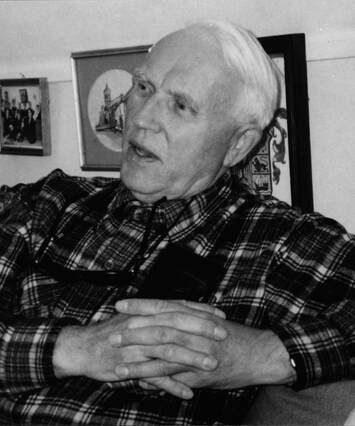During the Second World War my country Norway was occupied by Nazi Germany. I was active in the Resistance but was betrayed by a friend and arrested. After six weeks of solitary confinement and interrogations, I was condemned to death and lived under that threat for almost two years.
After the joyful days of liberation in May 1945, I was ordered by the Resistance to help guard the German prisoners in Oslo's Akershus Castle.
One day a car-load of prisoners-of-war arrived. They were in airforce uniforms and told us that they were innocent officers. But I recognized them as the brutal guards and the hated commander of the Grini concentration camp where I and others had suffered so much.
'Airforce officers!' I said to them. 'We know you and what you have done.' We saw by their looks that they had recognized us. This time, however, we were the masters. We gave them punishment drills as harsh as those they had given us, and made them sing the marching song that they had forced us to sing.
One of them, security officer Wilhelm Heilmann, begged me for some water as he was sweating and thirsty. I took a bucketful and threw it in his face. My Norwegian comrades laughed and I became popular. But I felt uncomfortable. Later, as I was going home, my conscience said, 'What you did was wrong.' It took me days to accept that I, a Christian and a Norwegian patriot, had evil demons inside me like the Gestapo.
Some years ago, much later, I met an old woman in Russia who had spent 17 years in Soviet labour camps and prisons. She told me, 'The 20th century has been a terrible one. So much violence and hate and suffering have been inflicted on people. May the 21st century be a redeemed one.'
How do people get redeemed? How do nations find redemption? To be more specific, how do I find it?
Two years ago, the events of nearly 50 years ago vividly welled up in my mind again. For the first time I pondered on what effect my acts could have had on the German prisoners.
I said to myself: 'I wonder whether Wilhelm Heilmann is still alive. If he is, I want to meet him and have an open, honest talk with him.'
I decided to go to Germany. Three days before I left I learned that Heilmann had been released in June 1951 and sent back to Hamburg. He might be living in Hinterbach, a village in the Beerfelden district.
Armed with a list of addresses and telephone numbers (there are at least 85 Wilhelm Heilmanns in Germany), I went to Beerfelden. I felt rather at a loss as to how to begin. So I prayed and asked God to lead me to someone who could help. As I drove into the centre of Beerfelden, I noticed that a meat shop was shutting. Suddenly I remembered that Heilmann was a butcher by profession.
By the time I had parked, the shop was closed. I quickly went around the building and entered the back door where three women were about to go home. None of them had heard of Heilmann but one of them fetched her husband who owned the shop. 'Heilmann is no longer living in Hinterbach. I don't know where he is now but the owner of the guesthouse in Finkenbach, Frau Hering, is related to him.'
From Frau Hering I learned that Heilmann had died five years earlier but his son and daughter lived in the city of Darmstadt. She told me that, while Heilmann was in Norway in 1944, his father, mother and four of his sisters had been killed in a British bombing raid on Darmstadt.
When I told Frau Hering why I wanted to meet her relative we had a long talk. The sufferings of both our families touched us deeply.
She put me in touch with Heilmann's daughter, Elfriede. 'I met your father in Norway,' I told her in our first phone conversation. 'I have been looking for him because I so much wanted to talk to him.'
'What did you want to talk to him about?'
'We were not friends. He was a guard at the Grini concentration camp and I was a prisoner.' Then I told her the whole story about the punishment drill and the bucketful of water, and how I had realized how wrong I had been. 'I wanted to tell your father how sorry I have been and to ask for his forgiveness.'
There was a moment's silence then a firm, clear voice said, 'I forgive you and I know that my father would have done, too.'
A few weeks later I spent several hours with Elfriede and her husband in Darmstadt. We went to the graveyard together and I placed three roses on Heilmann's grave. Standing there, I knew that God had healed the wounds of the past, the evil that I had inflicted on an enemy and on myself.
So many of my generation were raised on Darwin, Marx, Freud and a faith in limitless progress. We were so spellbound by our rigid worldview that we did not make any room for the moral and spiritual powers that exist beyond us; nor did we accept evil as a reality in or around us. That short-sightedness led to a lot of evil and destruction. It is my hope that today's generation will find a deeper understanding of human nature and the continuous battle between good and evil which is raging in the world. Only a commitment to choosing what is right can make the 21st century a redeemed one.
English



